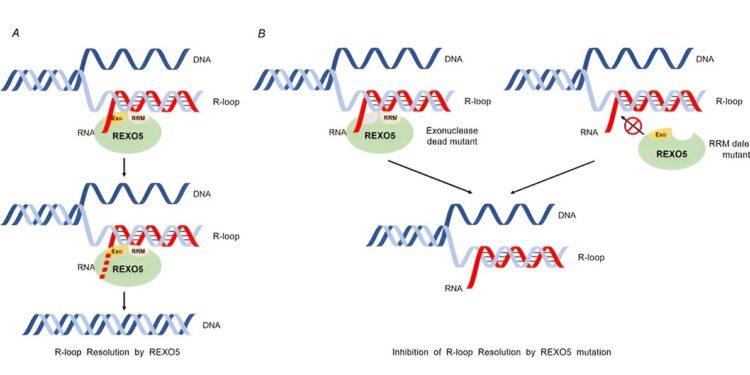Schematic image, showing R-loop resolution by REXO5 (left) and inhibition of R-loop resolution by REXO5 mutation (right). Credit: Leukemia (2024). DOI: 10.1038/s41375-024-02362-z
A key gene that could improve treatment success rates for chronic myelogenous leukemia (CML) has been discovered by researchers.
Professor Hongtae Kim and his research team from the Department of Biological Sciences at UNIST, together with Professor Dong-Wook Kim from Eulji University and Professor Jae Jin Kim from Hallym University, have unveiled a new role for REXO5 (RNA exonuclease 5) in the DNA Damage Response (DDR).
Their findings, published in Leukemiasuggest that REXO5 is linked to the development of leukemia through its role in increasing genomic instability.
CML results from the rapid proliferation of abnormal blood cells driven by the BCR::ABL1 fusion gene, which encourages hematopoietic stem cells to produce blood cells uncontrollably. Although targeted treatments like imatinib (Gleevec) have improved patient survival rates and offered potential cures, some patients face life-threatening challenges, including drug resistance or progression to the acute phase of the disease. disease.
In their research, the team identified high levels of REXO5 expression in samples from 60 CML patients, marking the first time that the link between REXO5 and the DNA damage response in leukemia has been been established. Although REXO5 is known for its role in RNA processing, its involvement in CML progression was previously unknown.
The REXO5 protein has been shown to contribute to increased genomic instability through the formation of R-loop structures, where RNA attaches to damaged DNA. Insufficient levels of REXO5 result in reduced DNA replication during the S phase of the cell cycle, significantly hindering cell growth.
Additionally, REXO5 plays a crucial role in repairing damaged DNA by using its RNA-binding sites to interact with and subsequently degrade R-loop RNA strands.
Professor Hongtae Kim said: “We have revealed the key molecular mechanisms by which REXO5 contributes to blood cancer. This achievement lays the foundation for the development of a leukemia treatment strategy focused on the DNA damage response. »
Professor Dong-Wook Kim said: “We have demonstrated the potential to slow or inhibit the acute progression of CML through novel therapeutic approaches that regulate the REXO5 protein. »
More information:
Ye Jin Lee et al, REXO5 promotes genomic integrity by regulating the R loop using its exonuclease activity, Leukemia (2024). DOI: 10.1038/s41375-024-02362-z
Provided by Ulsan National Institute of Science and Technology
Quote: Discovery of a key gene offers new hope in the treatment of chronic myelogenous leukemia (October 7, 2024) retrieved October 7, 2024 from
This document is subject to copyright. Except for fair use for private study or research purposes, no part may be reproduced without written permission. The content is provided for informational purposes only.



